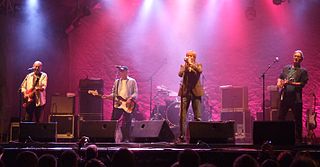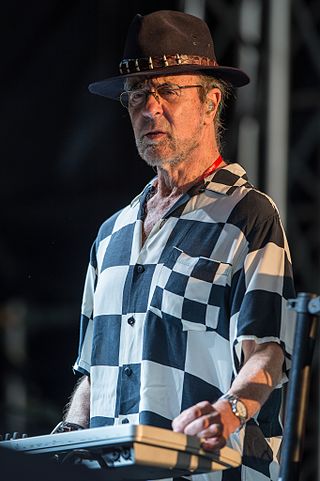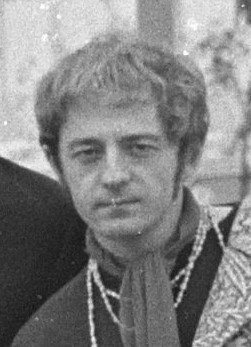
John Mayall is an English blues and rock musician, songwriter and producer. In the 1960s, he formed John Mayall & the Bluesbreakers, a band that has counted among its members some of the most famous blues and blues rock musicians.

Manfred Mann were an English rock band, formed in London and active between 1962 and 1969. The group were named after their keyboardist Manfred Mann, who later led the successful 1970s group Manfred Mann's Earth Band. The band had two different lead vocalists, Paul Jones from 1962 to 1966 and Mike d'Abo from 1966 to 1969.

John Symon Asher Bruce was a Scottish musician. He gained popularity as the primary lead vocalist and bassist of rock band Cream. After the group disbanded in 1968, he pursued a solo career and also played with several bands.

Paul Jones is an English singer, actor, harmonicist, radio personality and television presenter. He first came to prominence as the original lead singer and harmonicist of the rock band Manfred Mann (1962–66) with whom he had several hit records including "Do Wah Diddy Diddy" and "Pretty Flamingo".

For Your Love is the first American album by English rock band the Yardbirds. Released in July 1965, it contains new studio recordings along with previously released singles. The album features some of the earliest recordings by guitarists Eric Clapton and his replacement Jeff Beck.

Andrew Fairweather Low is a Welsh guitarist and singer. He was a founding member and lead singer of 1960s pop band Amen Corner, and in recent years has toured extensively with Roger Waters, Eric Clapton and Bill Wyman's Rhythm Kings.

Climax Blues Band are a British blues rock band. They have released at least 19 albums. "Couldn't Get It Right" reached No. 10 on the UK Singles Chart and No. 3 on the Billboard Hot 100 in 1977. "I Love You" peaked on the Billboard chart at No. 12 in 1981.
McGuinness Flint was a rock band formed in 1970 by Tom McGuinness, a bassist and guitarist with Manfred Mann, and Hughie Flint, former drummer with John Mayall; plus vocalist and keyboard player Dennis Coulson, and multi-instrumentalists and singer-songwriters Benny Gallagher and Graham Lyle.

The Blues Band was a British blues band formed in 1979 by Paul Jones, former lead vocalist and harmonica player with Manfred Mann, and guitarist Tom McGuinness also of Manfred Mann and The Roosters. The band’s first line-up also included bassist Gary Fletcher, slide-guitarist Dave Kelly who had previously played with The John Dummer Band, Howling Wolf and John Lee Hooker and drummer Hughie Flint, of John Mayall's Blues Breakers and McGuinness Flint, the band he formed with Tom McGuinness. In 1982, Flint left and was replaced by former Family drummer Rob Townsend. The group broke up in 2022.

"Do Wah Diddy Diddy" is a song written by Jeff Barry and Ellie Greenwich and originally recorded in 1963, as "Do-Wah-Diddy", by the American vocal group the Exciters. Cash Box described the Exciters' version as "a sparkling rocker that bubbles over with coin-catching enthusiasm" and said that the "great lead job is backed by a fabulous instrumental arrangement." It was made internationally famous by the British band Manfred Mann.
Hughie Flint is an English retired drummer, known for his stint in John Mayall & the Bluesbreakers during the early 1960s, mainly for his contribution towards their album Blues Breakers with Eric Clapton (1966).

Manfred Sepse Lubowitz, known professionally as Manfred Mann, is a South African-born musician, residing in the UK since 1961. He is best known as a founding member of the bands Manfred Mann, Manfred Mann Chapter Three and Manfred Mann's Earth Band.

Michael John Hugg is a British musician who was a founding member of the 1960s group Manfred Mann.
The Manfreds is a British pop group, formed in 1991 as a reunion of former members of the 1960s pop group Manfred Mann, however without their eponymous founder Manfred Mann.

Mighty Garvey! is the fifth and final studio album by Manfred Mann, released on 28 June 1968 by Fontana Records. It was the last recorded by the band after the change of direction and personnel of their 1966 album As Is. It continued a transition away from jazz and blues towards self-composed art-pop. Despite including two UK top 5 hit singles, the album did not chart and the band split up the year after. In the US and Canada, it was released as The Mighty Quinn by Mercury Records.
The Party Boys was an Australian rock supergroup with a floating membership commencing in 1982. Created by Mondo Rock's bass guitarist, Paul Christie, with founding member Kevin Borich as a part-time venture for professional musicians with downtime from their other projects; the group had temporary members from Status Quo, the Angels, Sherbet, Skyhooks, Rose Tattoo, the Choirboys, Australian Crawl, Divinyls, Models, Dragon and Swanee, plus international stars such as Joe Walsh, Eric Burdon, Alan Lancaster, and Graham Bonnet.
"5-4-3-2-1" is a 1964 song by British band Manfred Mann. It was written by Mann, Mike Hugg and Paul Jones, and peaked at #5 on the UK Singles Chart thanks to weekly television exposure from being the theme tune for the ITV pop music television programme Ready Steady Go!. This would be the last single released before bass player Dave Richmond left the band.

The discography of Rory Gallagher, an Irish guitarist and singer-songwriter, consists of 11 studio albums, 6 live albums, 13 compilations, and 5 singles. Gallagher was a solo artist for much of his career and collaborated with artists such as Muddy Waters and Jerry Lee Lewis. Before his career as a solo artist, Gallagher was the guitarist, vocalist, and saxophonist for the Irish rock trio Taste.
"Come Tomorrow" is a song written by American songwriters Bob Elgin, Dolores Phillips and Frank Augustus for rhythm and blues singer Marie Knight, who issued it as a single in October 1961 through Okeh Records, a release which received good reviews, though failed to chart. The best known version of the song was recorded by British pop band Manfred Mann, who took it to the top-ten in the United Kingdom in 1965.

The Five Faces of Manfred Mann is the debut British and second American studio album by Manfred Mann. It was first released in the United Kingdom on 11 September 1964 by His Master's Voice. In late October/early November, the album was released in Canada by Capitol Records. The Canadian track listing was almost the same as the UK version, except it included the hit "Do Wah Diddy Diddy" instead of "I've Got My Mojo Working". The record has been called "one of the great blues-based British invasion albums; it's a hot, rocking record that benefits from some virtuoso playing as well".
















